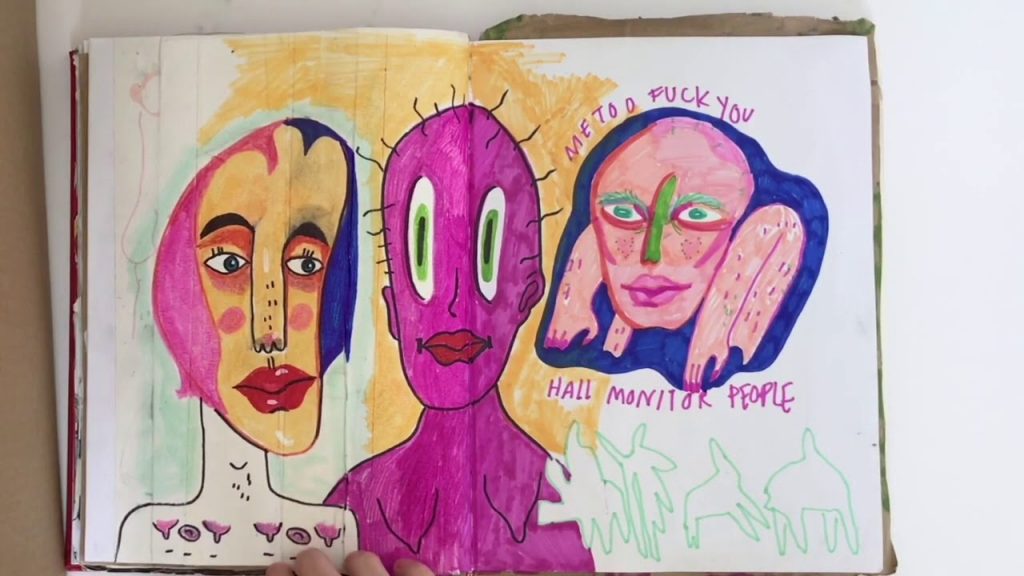As a female Pakistani artist, living in Australia, the web series This Is What An Iraqi Looks Like is just what I needed to watch this year. Created by HAJER, founder of the Iraqi Diaspora Creatives Network, it incorporates a collection of videos by artists, film-makers, and YouTubers. It has so many parallels to the politics of Pakistani identity, gender and culture, that I was left wonderfully comforted and curious to understand the history of Iraq. There is an impressive diversity in visual mediums and content. And with the creative industry struggling this year, it gives hope to the flourishing of the arts. In media, and pop culture, representation has been shifting and we are finally and thankfully seeing more honest portrayals of various nationalities. These videos reflect the unique, individualistic and yet collective experience of Iraqi identity, culture and story.

Blackland by Daby Zainab Faidhi stood out to me for its completely mesmerizing animation. As a visual artist, I was drawn to the story through the contrast of colours and forms that took shape within the story. The music provided the perfect atmosphere for suspense. Blackland speaks of the fortune being foretold of an elegant woman with long black hair. Images of her wading through water, while a hooded man stalks her in the shadows menacingly, are seen in the teacup she gives the fortune teller. Everything happily blooms around her, until she is imprisoned by the man who has followed her. The fortune-teller perceives that the woman is the city of Baghdad with memories of her past.
Another video that pulled me in was 2020 Sucked and I Made Art by Neel Jassani. I was instantly inspired by the immense talent and confidence Jassani displays in showcasing her beautifully absurd and playful drawings. She provides humorous and emotional anecdotes of how she lived through 2020 as she flips through each remarkably drawn page in her sketchbook. While the pandemic year has restricted art opportunities and created many challenges for artists and creatives alike, watching Jassani proudly share her work is deeply motivational and cathartic.

When I Close My Eyes by H & H was relevant to me as a Pakistani woman because of the resemblances to the gender disparity one encounters in Pakistan. It is a psychedelically layered video of women dancing provocatively to hypnotic music. In the background, one can hear a female voice talking about ‘what women want’, the policing of young women, and what Iraq used to be. For me, this harkens back romanticism of Pakistan’s past ‘before’ political unrest and insecurity.
Reems Ramadan by Reem El-Hassany was a homely watch that reminded me of Ramadan days with family spent in England. The added touch of speaking Arabic throughout the video added the element of familiarity and nostalgia. Many Muslims residing away from homes will be able to relate to this one. It is especially poignant as many people are unable to visit families and enjoy holidays together this year.
Other notable works include comedic videos such as Alex Beck by Alexander Beck and Boss Rants by Sura Ali where the generational gap between immigrant parents and their children is portrayed through witty musings on religion, upbringing and ancestry. Arab Enough by Fawzia Isrtrabadi and Goss with Zeena & Maya by Samya Rahmani and Hajer talks about how the surrounding people determine the nature of being Iraqi or Iraqi enough. The latter video is incredibly relevant to the nature in which belief and behaviour play a part in the dynamics of Pakistani society.
Conclusively, This is What an Iraqi Looks Like is an incredible feat of talented voices taking ownership of their stories. In doing so, it inspires people of colour, to the creative possibilities in subverting stereotypes. By the end of watching the entire series, I am not only intrigued to learn more about Iraqi diaspora, but also begin to understand my own. I would encourage a re-watch of each video to fully engage, relate and question our realities. In a somewhat bleak year, this web series has shone an optimistic light on what the future can hold.
Watch the series here:


